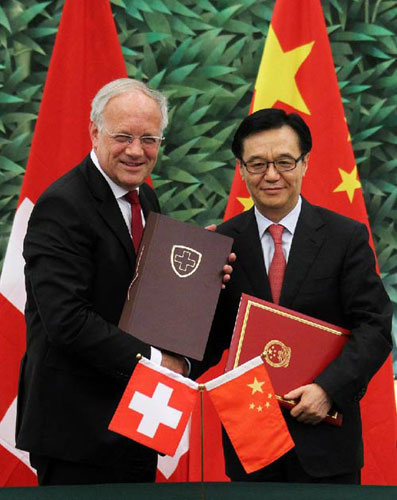Switzerland And China Advocate For Tariff Dialogue

Table of Contents
Switzerland's Position on Tariff Reduction and Open Trade
Switzerland boasts a long-standing commitment to free trade agreements, a policy deeply ingrained in its economic history and national identity. Its small, export-oriented economy thrives on open markets and relies heavily on unimpeded access to global trade routes. Switzerland's specific concerns regarding current tariff barriers center on maintaining its competitiveness in key sectors and ensuring the continued flow of goods and services across borders. Recent statements by Swiss officials underscore their unwavering support for multilateral trade discussions and their dedication to finding mutually beneficial solutions to reduce tariff barriers.
- Examples of Swiss trade agreements impacting tariff structures: The Swiss-EU Free Trade Agreement significantly reduces tariffs between Switzerland and the European Union, serving as a model for future agreements. Similar agreements with other nations further demonstrate Switzerland's commitment to Tariff Reduction Switzerland.
- Specific sectors where Switzerland seeks tariff reductions: The Swiss watchmaking industry, pharmaceuticals, and precision machinery sectors are particularly sensitive to tariff increases and benefit greatly from Bilateral Trade agreements that reduce these barriers.
- Swiss government initiatives promoting multilateral trade discussions: Switzerland actively participates in the World Trade Organization (WTO) and consistently advocates for a rules-based, multilateral trading system that promotes Tariff Reform and reduces trade protectionism. This commitment to the WTO reflects Switzerland's belief in the importance of International Trade Cooperation.
China's Stance on Constructive Tariff Negotiations
China's evolving role in global trade has seen a significant shift towards greater engagement in international trade negotiations. Recognizing the mutual benefits of reduced trade barriers, China has increasingly demonstrated its interest in constructive tariff dialogue. This shift is reflected in its active participation in various international forums and its willingness to engage in bilateral trade negotiations with numerous countries. The Belt and Road Initiative, for instance, underscores China’s commitment to fostering trade relationships and reducing impediments to commerce.
- China's participation in international trade organizations: China's membership in the WTO and its active participation in the Regional Comprehensive Economic Partnership (RCEP) showcase its dedication to the multilateral trading system. This demonstrates a willingness to engage in Tariff Negotiation China through established channels.
- Specific instances of China engaging in tariff negotiations with other countries: China's recent trade agreements with various nations reflect a proactive approach to reducing tariffs and fostering economic cooperation, showcasing China's commitment to China Trade Policy.
- Examples of Chinese economic policies that could benefit from reduced tariffs: The ongoing effort to upgrade its manufacturing base and advance its technological capabilities would be enhanced by access to a wider range of imported goods and services. This underscores the significant economic advantages of decreased Chinese Tariffs.
The Synergies Between Swiss and Chinese Approaches to Tariff Dialogue
Despite their differing economic structures and political systems, Switzerland and China share a common interest in reducing trade barriers and promoting fair and open trade. Both countries benefit from predictable and transparent tariff structures. Their collaboration in advocating for Tariff Dialogue could significantly influence global trade negotiations and set a positive example for other nations. This joint effort, however, is not without its challenges. Navigating differing perspectives on trade policy and overcoming potential political hurdles will require skillful diplomacy and a commitment to finding common ground.
- Areas of overlap in their trade policies: Both Switzerland and China advocate for a rules-based multilateral trading system and recognize the importance of predictable and transparent tariff structures. This shared vision provides a solid foundation for Sino-Swiss Relations and International Trade Cooperation.
- Potential benefits of a joint Swiss-Chinese initiative on tariff dialogue: A joint initiative could amplify their voices on the global stage, increasing the pressure on other nations to participate constructively in tariff reduction efforts. This could help accelerate Trade Liberalization and foster a more equitable Global Economic Governance.
- Challenges they may face in achieving their objectives: Differences in their approaches to certain trade issues, as well as geopolitical considerations, could complicate their collaborative efforts. Overcoming these challenges requires patience, compromise and a commitment to Trade Diplomacy.
Potential Impacts and Outcomes of the Tariff Dialogue
A successful tariff dialogue between Switzerland and China could yield significant positive economic outcomes. Increased trade volumes between the two countries, positive impacts on global supply chains, and potential spillover effects on other countries are all likely scenarios. However, it's also important to acknowledge potential challenges and negative consequences. The success of this initiative hinges on the willingness of other nations to participate constructively and on the ability of Switzerland and China to overcome potential obstacles.
- Increased trade volumes between Switzerland and China: Reduced tariffs would directly stimulate trade between the two countries, leading to increased economic activity and mutual benefits. This would directly impact Economic Growth in both nations.
- Positive impacts on global supply chains: Improved trade relations and reduced tariff barriers could streamline global supply chains, contributing to greater efficiency and lower costs for consumers worldwide. This could help prevent future Trade Wars.
- Potential for spillover effects on other countries: The success of this initiative could inspire similar dialogues between other countries, paving the way for broader tariff reductions and a more open global trading system. This is crucial for WTO Reform.
Conclusion: The Importance of Continued Tariff Dialogue Between Switzerland and China
The joint advocacy of Switzerland and China for open and constructive Tariff Dialogue represents a significant development in the current global trade landscape. Their collaboration holds immense potential for fostering economic cooperation, reducing trade tensions, and promoting a more equitable and stable international trading system. The potential positive impacts on global supply chains, Economic Growth, and Geopolitical Impact are substantial. The success of this initiative depends on continued engagement and a commitment to finding mutually beneficial solutions. We encourage readers to stay informed about further developments in Sino-Swiss trade relations and the ongoing efforts toward constructive tariff dialogue. For more information, visit the websites of the Swiss Federal Department of Economic Affairs, Education and Research and the Ministry of Commerce of the People’s Republic of China. Let's work together to promote free and fair Sustainable Trade.

Featured Posts
-
 Teletoon S Spring Lineup Jellystone And Pinata Smashling Highlight New Shows
May 21, 2025
Teletoon S Spring Lineup Jellystone And Pinata Smashling Highlight New Shows
May 21, 2025 -
 Clean Energy Boom Undermined Examining The Obstacles
May 21, 2025
Clean Energy Boom Undermined Examining The Obstacles
May 21, 2025 -
 The Pursuit Of A New Trans Australia Run Record
May 21, 2025
The Pursuit Of A New Trans Australia Run Record
May 21, 2025 -
 Stijgende Huizenprijzen Abn Amros Analyse En Rentevoorspelling
May 21, 2025
Stijgende Huizenprijzen Abn Amros Analyse En Rentevoorspelling
May 21, 2025 -
 Porsches Struggle Balancing Ferraris Sportiness And Mercedes Luxury In A Trade War Climate
May 21, 2025
Porsches Struggle Balancing Ferraris Sportiness And Mercedes Luxury In A Trade War Climate
May 21, 2025
